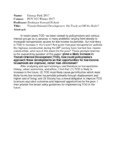| dc.rights.license | In Copyright | en_US |
| dc.creator | Park, George Brett | |
| dc.date.accessioned | 2017-05-22T12:43:54Z | |
| dc.date.available | 2017-05-22T12:43:54Z | |
| dc.date.created | 2017 | |
| dc.identifier | WLURG38_Park_POV_2017 | |
| dc.identifier.uri | http://hdl.handle.net/11021/33867 | |
| dc.description | George Brett Park is a member of the Class of 2017 of Washington and Lee University. | en_US |
| dc.description | Capstone; [FULL-TEXT FREELY AVAILABLE ONLINE] | en_US |
| dc.description.abstract | In recent years TOD has been viewed by policymakers and various interest groups as a panacea to many problems ranging from obesity to increased transportation access for low-income households. But how likely is TOD to increase in the future? And given how past transportation policies like highway construction during the 20th century have harmed low-income communities, what would this mean for the poor? These prompts lead me to the overarching question of this paper: given a likely increase in Transit-Oriented Development (TOD), how could policymakers approach these developments so that opportunities for low-income households are improved, rather than diminished?
After analyzing and synthesizing a vast literature on transportation history, urban economics, and ethics, I find that: (1) TOD is likely to increase in the future; (2) TOD most likely cause gentrification which most likely harms low-income households primarily through displacement and higher cost of living; and (3) Society has a moral obligation to improve TOD to ensure equitable outcomes and improved opportunities for the poor. I then provide five broad policy guidelines for implementing TOD in the future. | en_US |
| dc.description.statementofresponsibility | George Park | |
| dc.format.extent | 44 pages | en_US |
| dc.language.iso | en_US | en_US |
| dc.rights | This material is made available for use in research, teaching, and private study, pursuant to U.S. Copyright law. The user assumes full responsibility for any use of the materials, including but not limited to, infringement of copyright and publication rights of reproduced materials. Any materials used should be fully credited with the source. | en_US |
| dc.rights.uri | http://rightsstatements.org/vocab/InC/1.0/ | en_US |
| dc.subject.other | Washington and Lee University -- Capstone in Shepherd Program for the Interdisciplinary Study of Poverty and Human Capability | en_US |
| dc.title | Transit-Oriented Development: On Track or Off the Rails? | en_US |
| dc.type | Text | en_US |
| dcterms.isPartOf | RG38 - Student Papers | |
| dc.rights.holder | Park, George Brett | |
| dc.subject.fast | Transit-oriented development | en_US |
| dc.subject.fast | Gentrification | en_US |
| dc.subject.fast | Capabilities approach (Social sciences) | en_US |
| dc.subject.fast | Discrimination in housing | en_US |
| local.department | Shepherd Poverty Program | en_US |
| local.scholarshiptype | Capstone | en_US |
